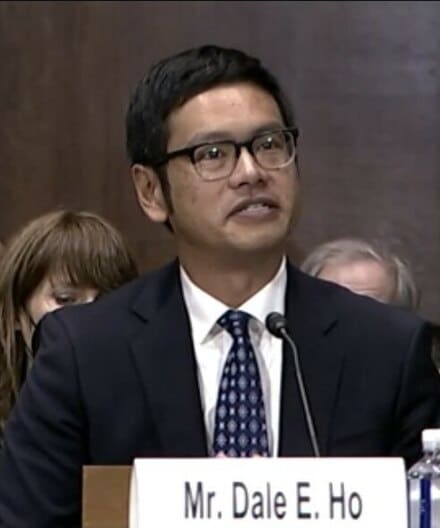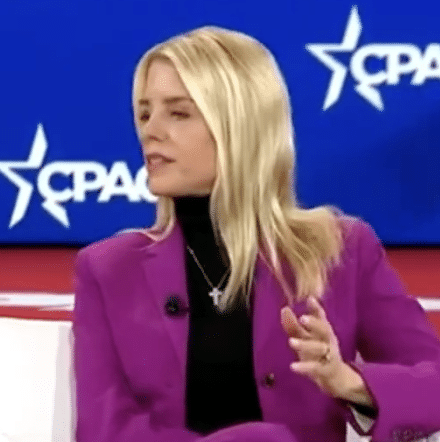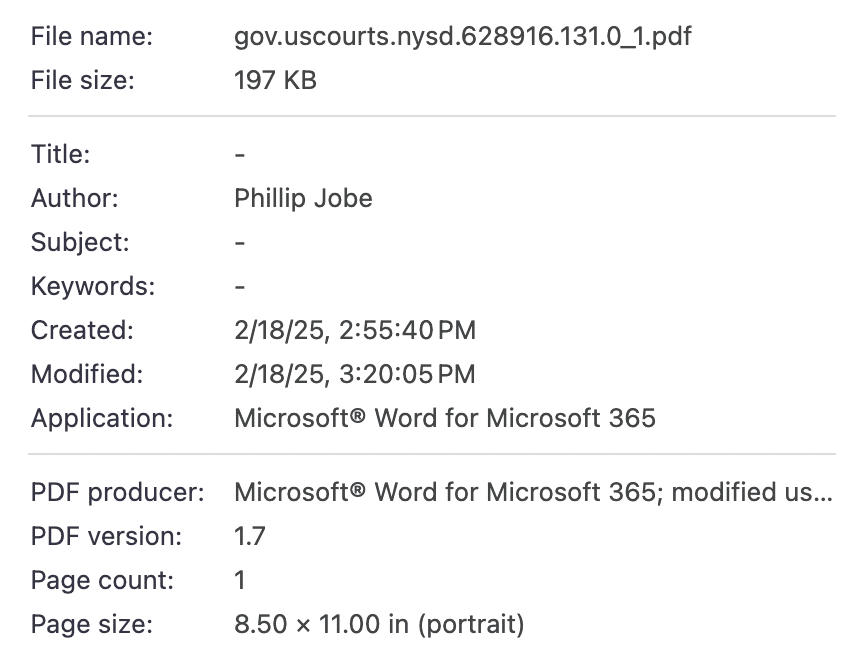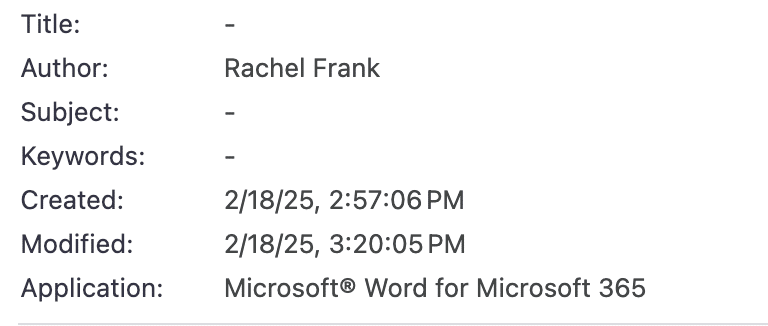Judge Dale Ho Had Emil Bove Authenticate His Letter to Danielle Sassoon
A bunch of legal and governmental ethics experts, as well as Norm Eisen’s Democracy Defenders Fund, have filed an amicus motion that could (though is unlikely) to affect Judge Dale Ho’s forthcoming consideration of whether to dismiss the case against Eric Adams.
The motion asks Judge Ho to ask Paul Clement, in the latter’s role as an amicus, to consider whether Emil Bove violated professional ethics in trying to dismiss this case.
Amici submit that the inquiry should include whether Acting Deputy Attorney General Emil Bove violated the Rules of Professional Responsibility and applicable Department of Justice guidelines in his conduct of this matter.
[snip]
First, to direct Mr. Clement to conduct a factual inquiry into whether Mr. Bove violated any of the Rules of Professional Conduct or Department of Justice prosecutorial policies or standards; and
Second, to hold an evidentiary hearing to determine whether, in fact, Mr. Bove violated any of the Rules of Professional Conduct or Department of Justice prosecutorial policies or standards.6
6 Pursuant to Canon 3(B)(6) of the Code of Conduct for United States Judges, this Court has the discretion to impose a remedy – beyond denial of the Motion to Dismiss – if it determines that Mr. Bove violated any of the Rules of Professional Conduct. The Canon provides that “[a] judge should take appropriate action upon receipt of reliable information indicating the likelihood that . . . a lawyer violated applicable rules of professional conduct.” (Emphasis added.)
They include a list of rules that Bove might have violated.
RPC 5.1(b)(2). This Rule requires that Mr. Bove, as a supervising lawyer in the Department of Justice, ensures that the lawyers he supervises comply with the Rules of Professional Conduct, including Acting U.S. Attorney for the Southern District of New York Danielle Sassoon, and lawyers in the Department of Justice’s Public Integrity Section, whom Mr. Bove directed to sign the Motion;
RPC 1.11(f)(3). This Rule prohibits a lawyer who is a public official from accepting an offer of anything of value in exchange for influencing official action. If, in fact, Mr. Bove accepted an offer from Mayor Adams as a quid pro quo in the form of cooperating in the enforcement of the Administration’s immigration policies, he may have violated this ethical duty;
RPC 3.3(a)(1). This Rule prohibits Mr. Bove from knowingly making a false statement of fact or law to a tribunal. If the reasons given by Mr. Bove in support of his Motion and his statement that there was no quid pro quo are false, he may have violated this ethical duty; and
RPC 8.4(d). This Rule prohibits a lawyer from engaging in conduct that is prejudicial to the administration of justice. If Mr. Bove’s justifications for the Motion are pretextual and an abuse of his prosecutorial power, granting the Motion may be prejudicial to the administration of justice.
The most compelling theory substantiating abuse was the way Bove serially threatened attorneys with investigation and firing if they did not sign onto his motion to dismiss the case, along with the investigations he initiated against those who refused.
If either or both of the lawyers who signed the Motion were pressured into doing so, as has been reported, this would irrevocably taint the Motion. By signing the Motion, under Rule 3.3(a)(1), Mr. Bove represented to this Court that the Motion did not contain a false statement of fact or law. There is a substantial basis here to inquire whether Mr. Bove made representations knowing at the time that they were false. The Court should not be placed in the position of granting a Motion lacking in honesty and integrity.
[snip]
When the prosecutors on the team prosecuting Mayor Adams expressed concerns about the legal and ethical propriety of the dismissal, Mr. Bove responded with a campaign of retaliation — placing them on administrative leave and initiating investigations. Bove Letter at 1. These actions are inconsistent with Mr. Bove’s duty to seek justice.5
[snip]
Punishment of career prosecutors for adhering to their oaths and ethical obligations, if proven, would certainly constitute conduct prejudicial to the administration of justice.
The amicus also notes that, particularly in the face of Bove’s claim that DOJ attempted to interfere in an election by indicting Mayor Adams nine months before the Democratic primary, his efforts to dismiss the indictment months before the primary may have been intended to influence an election.
By arguing to the Court that the prosecution should be dismissed because it is interfering with Mayor Adams’s ability to run for re-election, Mr. Bove has raised the specter that dismissal is being sought with the purpose of affecting the upcoming June 24 primary election—now just a few months away—in which Mayor Adams is a candidate. Hearing Transcript at 26. It is also apparent that dismissal would give Mayor Adams an electoral advantage he otherwise would not have. In sharp contrast, Ms. Sassoon has explained that the decision to bring the indictment in September 2024 was made nine months before the June 2025 Democratic Mayoral Primary and more than a year before the November 2025 Mayoral Election and “complied in every respect with longstanding Department policy regarding election year sensitivities and the applicable Justice Manual provisions.” Sassoon Letter at 4
Now, I’m skeptical that this request will lead to a fulsome evidentiary hearing about Bove’s conduct.
But by putting all this on the record, including the threats to prosecutors, it might provide Ho a tool to do something else he laid the basis to do.
The lawyers included the transcript of the hearing with their motion. And there’s a part of it that was far more subtle than what made into reports of the hearing.
Virtually every report of the hearing described that the question of whether Ho should rely on amici came up. Most focused on Bove’s attack on Carey Dunne and Mark Pomerantz, and his request that Ho ignore that amicus.
I do object to consideration of the second amicus at Dkt. 128 purported to be filed on behalf of a series of former U.S. Attorneys. And, again, acknowledging the Court has broad discretion about if, how, and when to invite amicus participation, a brief authored by Carey Dunne and Mark Pomerantz, who are both central to the investigation at the New York District Attorney’s Office of President Trump, it just comes from a place of such bias and lack of impartiality, that that’s not a friend of the Court’s submission. That’s a group of people claiming that — I think the words in the brief are there should be — I think the word “roving” might have even been used, a roving factual inquiry into the situation.
That’s just partisan noise. That’s not an amicus brief actually trying to help your Honor with the issues that are before you. So I submit that the Court should not accept the amicus at Dkt. 128.
But before that — the first time Judge Ho raised the amicus briefs — he did so after questioning Alex Spiro about the letter he sent to Bove on February 3, which Spiro himself docketed. After Spiro gave a representation of why he wrote that letter, Judge Ho turned to Bove and asked him about the February 10 letter he sent Danielle Sassoon, which was before him because it was attached to the Pomerantz amicus.
This first discussion was not about whether Bove opposed the amicus itself. It was, like the preceding discussion about why Spiro wrote the February 3 letter, whether the February 10 memo he sent Sassoon was authentic.
Mr. Bove, I believe this is a memorandum dated February 10, 2025, regarding the Justice Department’s decision to dismiss the case, and that is titled “Dismissal Without Prejudice of Prosecution of Mayor Adams.” Is that right?
MR. BOVE: Yes, Judge.
THE COURT: And you’re familiar with this memo?
MR. BOVE: Yes.
THE COURT: Are you the author of the memo?
MR. BOVE: Yeah. Those are my initials.
THE COURT: Okay. And this is authentic? It was submitted in connection with an amicus brief. I want to confirm that.
MR. BOVE: This is the memorandum I sent to Ms. Sassoon on that date. I do have a procedural objection to the amicus brief we’re talking about, but I want to be responsive first to the Court’s question.
THE COURT: Okay. I mean, I haven’t made any kind of ruling on the amicus brief.
MR. BOVE: I would like to be heard on that point.
THE COURT: I do want to address your views about whether or not the Court should consider certain things, including the amicus brief. But this memo, Mr. Bove, did this represent the official views of the Justice Department as of this date?
MR. BOVE: I mean, this is the authentic document that I sent to Danielle Sassoon.
THE COURT: Okay. And when I consider the government’s motion to dismiss, is it appropriate for me to consider what’s in this memo?
MR. BOVE: No.
THE COURT: Okay. Explain that to me.
MR. BOVE: The record here is the motion that I made. The only question — basically, if you start with the Rinaldi footnote 15, the Supreme Court case, you look at the more recent Second Circuit cases, Blaszczak, HSBC, the only two questions are is there some concern about harassment. Your Honor has addressed that conclusively today.
And then, second, is there a question about whether the motion is so clearly contrary to the public interest that the Court should not grant it.
[snip]
Considering documents outside the record I don’t think is part of that discretion. Even if your Honor considers this, it’s entirely consistent with everything that I’ve said. [my emphasis]
Later, Judge Ho got Spiro to back off his opposition to amici generally (Spiro had raised concerns that, “Any person that comes before the Court could have political motivations”) to state that he did not take a position on the non-Pomerantz memo.
THE COURT: Just so I understand it, what I heard from the government, and, Mr. Bove, correct me if I’m wrong, is that you object to the brief, the second of the two amicus briefs that was filed, the former U.S. Attorneys one, but not to the common cause one. Whereas, Mr. Spiro, you object to both?
MR. SPIRO: We take no position on whether the pending letter motion is part of the record. If it ends there.
THE COURT: I’m sorry. Do you object to the Court considering — granting either of the motions? I shouldn’t put it in terms of the Court. Do you object to either of the motions for amicus submissions? I just want to make sure my record is clear so I understand what I’m doing when I’m ruling.
MR. SPIRO: I don’t take a position on the first letter motion.
THE COURT: Okay. Thank you.
MR. SPIRO: I don’t take a position on it. Any further involvement, I rest on the record I just made.
You’ll recall that two of the questions Ho asked Paul Clement to address were whether he should consider other materials beyond the Rule(48) motion itself.
2) Whether, and to what extent, a court may consider materials other than the Rule 48(a) motion itself;
3) Under what circumstances, if any, additional procedural steps and/or further inquiry would be appropriate before resolving a Rule 48(a) motion;
Now, it’s unclear whether Ho will consider the amicus itself; it is dated Friday (Ho’s deadline for additional amici) but not docketed until yesterday, so he could ignore it on that basis alone. But it does provide a theory by which these letters come in based on Bove’s own conduct.
But he may not need it.
He was clearly focused on something else: Alex Spiro’s letter from February 3, seemingly mapping immigration assistance that Adams would provide if the case were dismissed, and Bove’s letter to Sassoon claiming (among other things) that the investigation by that point was an example of weaponization.
Of note, Judge Ho did not say anything when Bove claimed that his judgement that the case was politicized overrode Ho’s own opinion from January that it wasn’t.
The first is just a straightforward exercise of prosecutorial discretion guided by President Trump’s Executive Order 14147 relating to weaponization of the criminal justice process as well as guidance issued by the Attorney General on the day she was sworn in, February 5, 2025.
And basically what is set forth here is my conclusion that this case, as a matter of prosecutorial discretion, should not proceed because it reflects, at minimum, appearances of impropriety that give cause for concern about abuse of the criminal justice process. And I believe it actually goes further than that and it is an abuse of the criminal justice process.
That matter, which, again, in an exercise of prosecutorial discretion, is, I think, as your Honor alluded to earlier, virtually unreviewable in this courtroom, especially where guided by an Executive Order and direct guidance from the Attorney General.
This claim is legally noxious, because it suggests that Bove can override an opinion from Judge Ho (though Bove never acknowledged that Ho had made that ruling). But Ho didn’t point out that Bove’s opinion basically attempted to overrule Ho’s own earlier opinion.
He did, however, react a bit when Spiro used the leaked Sassoon letter to reiterate his earlier argument about leaks.
MR. SPIRO: Well, I don’t want to digress. We didn’t have a hearing about it. But the reality is, the letter that leaked, the letter that I think we can both agree, sir, the letter that leaked with the back and forth between the Department of Justice did have prejudicial and false information about the mayor in it. There was a letter that leaked, that we can I hope both agree, couldn’t have been leaked, since it was internal to the Department of Justice, from any third outside party or bogeyman.
THE COURT: I’m sorry. You’re not referring to stuff that was the subject of motions practice earlier?
MR. SPIRO: No, I’m talking about now.
THE COURT: Okay.
MR. SPIRO: Yes, your Honor.
THE COURT: I got confused. I apologize. Go ahead.
MR. SPIRO: Not at all. But I’m just saying, I think the Court has to think about that. And the Court can keep thinking about, and the Court can always revisit its beliefs. Earlier in the case when I said things like, doesn’t this seem a little off, and doesn’t this seem a little politically motivated, and doesn’t it seem there are a lot of leaks going on. The Court can look at the cavalier nature with which the prosecutors put things in those letters that went back and forth when the Department of Justice was discussing this matter.
It remains the case that the most likely outcome of this is that Judge Ho dismisses the case against Adams with prejudice, depriving DOJ of any leverage over the Mayor.
But unnoticed by most of the coverage, Ho laid the foundation to rely on exchanges that happened before everything blew up on February 12.
Update: Relatedly, Jamie Raskin and Jasmine Crockett sent Pam Bondi a request for information on the Adams case. Their key hook is the possibility that Bove might have destroyed the notes of the January 31 meeting he confiscated.
All handwritten or electronic notes taken during the January 31, 2025, meeting between Department prosecutors and Mayor Adams’ legal team. If any notes have been destroyed, please provide the names of individuals who destroyed the notes, as well as the dates, manner, and reasons for such destruction.
The request is imperfect in some ways. For example, it doesn’t include Bill Burck and Eric Trump or Trump Organization in the list of conversations; Burck has an apparent conflict by representing both Trump Org and Adams. Similarly, it doesn’t ask for communications from Chad Mizelle, who was clearly in this loop as well.
But it is the kind of thing that–if there were real scrutiny of Bove’s ethical problems–could become a problem with DOJ.
Update: Fixed the first sentence, I hope.





